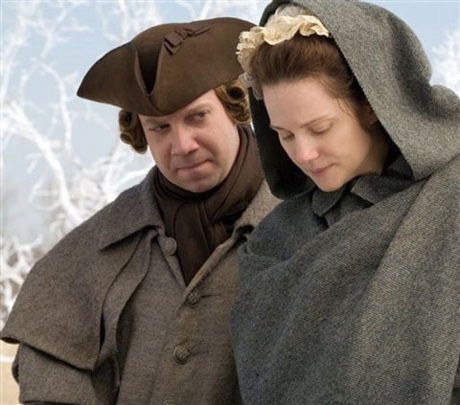« Indoctrinate U (2007) – Movie Review | Home | Expelled: No Intelligence Allowed (2008) – Movie Review »
John Adams (2008) – Miniseries Review
By Robert L. Jones | July 4, 2008

Paul Giamatti and Laura Linney during a moment of crisis in HBO's "John Adams"
Little Big Man
[xrr rating=5/5]
John Adams. Miniseries starring Paul Giamatti, Laura Linney, David Morse, Clancy O’Connor, Sarah Polley, Rufus Sewell, Justin Theroux, Tom Wilkinson, Danny Huston, Stephen Dillane, Samuel Barnett, Tom Beckett, John Bedford Lloyd, Jean Brassard, Ritchie Coster, John Dossett, Mamie Gummer, Steven Hinkle, Tom Hollander, Zeljko Ivanek, Ebon Moss-Bachrach, and Michael Hall D’Addario. Music by Rob Lane and Joseph Vitarelli. Cinematography by Tak Fujimoto, A.S.C., and Danny Cohen. Production design by Gemma Jackson. Costume design by Donna Zakowska. Edited by Melanie Oliver. Screenplay by Kirk Ellis and Michelle Ashford. Based on the book by David McCullough. Directed by Tom Hooper. (HBO Films/Playtone Productions, 2008, color, seven episodes/total running time: 8 hours, 21 minutes.)
Reclining on the front porch of his family farmhouse in Quincy, Massachusetts, nursing a broken foot, an aging John Adams predicts to wife Abigail his presence fading from the books to be written by historians.
“The essence of our revolution will be that Dr. Franklin smote the earth with his electrical rod, and out sprang Washington and Jefferson!”
John Adams never did fit neatly within the Holy Trinity of America’s founding fathers. It would have been too anticlimactic ever to envision him ensconced atop a pillared pantheon with our national gods of jovial wisdom, stoic heroism, and searing intellect. It would have been an act of desecration to include such a squat, crabby bulldog of a man.
In this brilliant adaptation of historian David McCullough’s weighty (but never dragging) 2001 volume, John Adams’s legacy stubbornly refuses to go away. What becomes of history’s runts with outsized cerebral gifts and aspirations? They are already cursed from the word “go.” Half their life’s work consists in overcoming skeptical patronizing by men with smaller minds, who, in a cruel twist of fate, were born blessed with larger physical stature.
Rather than using the standard biopic template—squeezing the highlights of Adams’s life into the deceptively short eight hours of this mini-series—screenwriter Kirk Ellis instead uses each episode to dramatize a crucial event that tests his protagonist’s mettle. Veteran character actor Paul Giamatti, who has made a career of playing lovable losers in movies like Sideways and American Splendor, at last portrays a man of great character and moral, if not physical, stature.
From the first episode, Adams’s integrity is put to the test. The year is 1770 and two American colonists lie dead in the cold New England snow, cut down by British muskets. The only lawyer in Boston who will take up the defense of the Redcoats accused of murder is Adams, who is not only sympathetic to the colonists’ cause against oppressive taxation but is also cousin to Samuel Adams, hotheaded ringleader of the Sons of Liberty.
He refuses to let political considerations enter his defense of Captain Preston (Richie Coster) and his men. “You may expect from me no art of address, no sophistry, no prevarication in such a cause,” he brusquely informs the accused soldiers. He also refuses to buckle under pressure when firebrand Sam (Danny Huston) questions his loyalties. “I am for the law, cousin. Is there another side?”
In the riveting courtroom drama that follows, it’s Adams’s steadfast and forthright devotion to principle that eventually carries the day, despite his dangerously unpopular cause. Even as witnesses are openly intimidated in the courtroom by rowdy Sons of Liberty members, Adams prevails upon the jury to decide the case solely on the evidence. “Facts are stubborn things,” he argues.
It is that very commitment to principle, coupled with a bullheaded stubbornness, that in 1775 propels “Plain” John Adams to the Continental Congress in Philadelphia, to become one of the first to advocate independence. While Benjamin Franklin worked behind the scenes to change minds and Thomas Jefferson silently avoided debate (though he would later pen the Declaration of Independence, at Adams’s urging), Adams alone broke through Quaker pacifist John Dickinson’s stonewalling like a battering ram, convincing the assembly to make a clean break from England.
It is after declaring independence, though, that we truly see what Adams’s principles are made of. Meeting with Jefferson in Paris, many brilliant and concise exchanges between the men reveal two opposing philosophies working towards the same goal—securing the rights of men. In contrast to Jefferson’s enlightenment notions of individual liberty resting all power in the people, Adams’s advocated a more Tory approach of checking power with power. When Jefferson (Stephen Dillane) accuses Adams of a “disconcerting lack of faith in your fellow man,” Adams is quick to rejoin: “Yes. And you display a dangerous excess of faith in your fellow man, Mr. Jefferson.” He confesses earlier—after witnessing the tarring and feathering of a British tax collector at the hands of raucous Sons of Liberty—to wife Abigail his fear of democracy backsliding into mob rule. “People are in need of government, Abigail. Restraint. Most men are weak, evil, and vicious.” It was from Adams, not Jefferson, that we got the ideal of “a government of laws, not men.”
Although portrayed as a principled man who never betrayed his country or family, John Adams is also depicted as a flawed man. But after viewing this deeply moving, indeed loving, portrait of a very imperfect man, I concluded that it was Adams’s status as a mere mortal that was the source of his wisdom. Later elected to the presidency, it is his clearheaded thinking that keeps America out of “an unnecessary war” between France and England. Although accused of “monarchist” aspirations, Adams spends much of his time thwarting Alexander Hamilton’s actual monarchical designs in trying to increase the power of the executive branch and too closely allying America with England. He also feels vindicated when America is able to secure an agreement of peace from Napoleon Bonaparte’s France. Though Jefferson is not present in the room, Adams almost seems to be addressing that idealistic enthusiast of the French Revolution when he grouses, “From monarchy to anarchy, and back to monarchy again.”
Essential to Adams’s character was his wife, Abigail, played convincingly and compassionately by Laura Linney. Adams sought her advice more than anyone else’s. More than a companion and mother to his children and hardly a yes-woman, Abigail would tell John what he needed to hear, not just what flattered his ego. Linney’s Abigail never comes off as spiteful but rather as a harsh, exacting critic who keeps Adams in check when his zeal gets the better of him. Among the most touching and genuine scenes in the series are those between husband and wife—not just personally, but also in the way they demonstrate that Adams practiced what he preached on the subject of checking powers.
In its final chapter, John Adams is also a poignant redemption story, as the shorter patriot shows himself to be the bigger man by reconciling with Jefferson, who had betrayed him during the 1800 election. The exchange of letters over the last years of the old men’s lives is related simply, through montage and voiceover, conveying the power of their ideas while simultaneously dramatizing the fact that each was incomplete without the friendship and esteem of the other. In an ending more implausible than Hollywood could have ever concocted—yet historically accurate and so singularly apropos—the two men’s lives are connected for one last time in the history of the Republic they created.
Paul Giamatti is a perfect fit for John Adams, bringing intense conviction and intellect to this role of a lifetime. His passionate brand of acting, of going for broke without ever going over the top, first made an impression on me when I saw him in Duets, playing a down-and-out karaoke singer. From that godawful script he elevated his lines to become something profound. I immediately thought Giamatti’s talent was wasted, and that he’d be a perfect Cyrano de Bergerac.
To witness Giamatti’s physical acting is to understand what made John Adams tick. Pain, anguish, and bitterness play across his face as he tries unsuccessfully to keep a stiff upper lip in the face of so many of life’s failures. The producers knew exactly what they were doing when they cast him. Giamatti is no pretty boy, not pleasing to look at—but so fascinating to watch.
I have never before been so captivated by a miniseries. The cast and production are A-list and never for a moment had that “made for television” feel that miniseries used to exude. Giamatti and Linney are joined by stellar acting from the rest of the principals, especially Tom Wilkinson as Franklin, Rufus Sewell as Hamilton, plus Dillane and Huston. The filming and production design are no less exceptional. Cinematographers Tak Fujimoto and Danny Cohen use inventive shots that are never obtrusive. One example occurs during the time Adams was quarantined in Holland with consumption: Positioning him in his box bed behind open door frames and parquet flooring, Adams seems trapped in a Vermeer painting.
We live in a perverse age, in which great men are pilloried and cut down to size. It is therefore all the more unexpectedly welcome to watch this stupendous miniseries, which shows us just how large this little man from Massachusetts loomed in America’s creation.
Robert L. Jones is a photojournalist living and working in Minnesota. His work has appeared in Black & White Magazine, Entrepreneur, Hoy! New York, the New York Post, RCA Victor (Japan), Scene in San Antonio, Spirit Magazine (Canada), Top Producer, and the Trenton Times. Mr. Jones is a past entertainment editor of The New Individualist.
Topics: Biopics, Costume Dramas, Courtroom Dramas, Dramas, Made for Cable, Miniseries | Comments Off on John Adams (2008) – Miniseries Review
